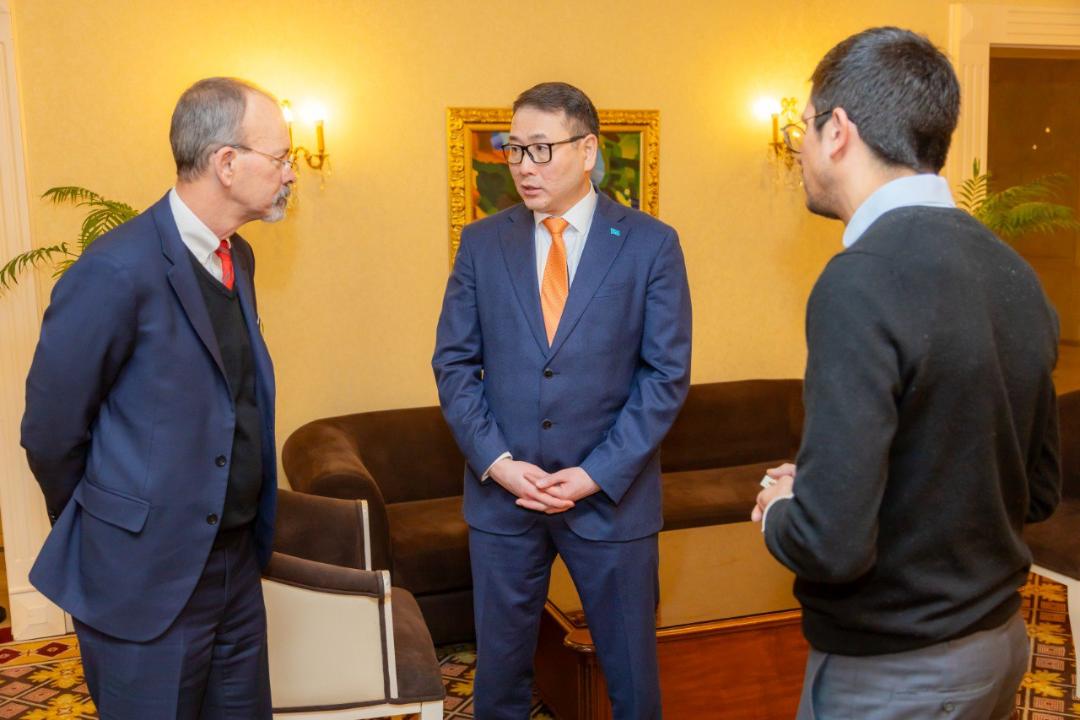ASTANA – Kazakh Minister of Trade and Integration Arman Shakkaliyev took part in the business meeting on Feb. 1, where Organization for Economic Cooperation and Development (OECD) experts presented new reports on Trade Facilitation in Central Asia and on Realizing the Potential of the Middle Corridor, reported the ministry’s press service.

William Tompson, Head of the OECD Eurasia Division and Arman Shakkaliyev, Minister of Trade and Integration of Kazakhstan. Photo credit: Ministry of Trade and Integration.
In its report, the OECD focused on the development of trade relations among Central Asian countries and Kazakhstan’s export ecosystem. According to the OECD, countries in the region have achieved positive results in simplifying and optimizing trade procedures and automating customs operations.
Opening the event, William Tompson, Head of the OECD Eurasia Division, noted that addressing the challenges caused by geopolitical events requires the countries of the region to integrate both at the regional and international levels, upgrade existing infrastructure, and remove barriers to trade. In that regard, trade facilitation plays a pivotal role in achieving these goals by reducing trade costs and fostering integration.
According to Shakkaliyev, the mutual trade turnover between Kazakhstan and the Central Asian countries is growing. The leading trading players in the region are Kazakhstan and Uzbekistan. Moreover, Kazakhstan accounts for over half of the volume of foreign trade operations with OECD countries.
“For Kazakhstan, as one of the largest partners of Central Asian сountries, it is important to follow OECD principles and standards in various sectors of the economy. As part of the project, we are doing a lot of work to strengthen and develop regional trade connectivity. In this context, special priority is given to strengthening Kazakhstan’s competitive economy and export ecosystem,” Shakkaliyev said.
Gregory Lecomte, Head of Central Asia Unit, presented the key points of the reports on trade, transport connectivity of Central Asian countries and provided recommendations for improvement of trade procedures.
According to Lecomte, it is recommended to continue working to improve access to documentation, boost digitalization in trade-related procedures, and build up infrastructure to enhance intra-regional trade and inter-regional freight of goods.
“In particular, Kazakhstan is recommended to expand the existing structures of the single window service and reduce compliance costs”, said Lecomte.
During the event, participants stressed the importance of developing the Trans-Caspian International Transport Route (TITR), or the Middle Corridor.
Ambassador of Lithuania to Kazakhstan Egidijus Navikas noted that connecting Central Asia and Europe through the Middle Corridor is one of the main tasks in ensuring the transit of goods.
In turn, Kazakh Deputy Minister of Trade and Integration Kairat Torebayev shared information about the region’s dynamic development of transport logistics. In recent years, cargo deliveries to Europe have increased through the TITR, which passes territories of the Caspian Sea, Azerbaijan, and Georgia. Thus, the volume of cargo transportation along the Middle Corridor increased by 1.8 times; only in 2023, 2.8 million tons of cargo were transported through the TITR. The increase was 86% compared to the previous year.
The OECD report on the potential of the Middle Corridor includes infrastructure development along the route and related services. In addition to the transit functions of TITR, the promotion of exports of goods and services is of particular importance for Kazakhstan. The ministry and QazTrade Trade Policy Development Center take efforts to simplify trade procedures and continue to expand trade cooperation with Central Asian countries.
According to Deputy General Director of QazTrade Nurlan Kulbatyrov, the implementation of OECD recommendations and transition to paperless trade will lead to an increase in trade turnover by 30% in the medium term, which is a priority indicator for Kazakhstan.
At the end of the business meeting, the participants expressed confidence in strengthening cooperation on the current agenda and deepening collaboration in critical areas.
